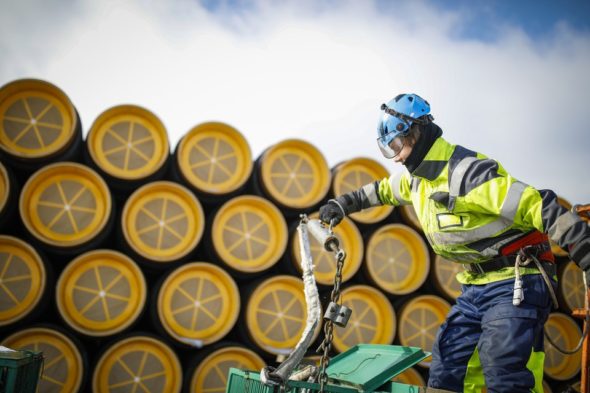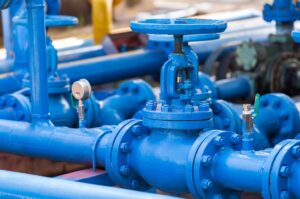When making the decision to apply for the certification, Russians may have two goals in their mind. The first one is a quiet acceptance of the gas directive that they officially criticize and try to challenge at various tribunals. The second one is probing how Berlin, the German regulator BNetZa and the European Commission will react to this move – Bartosz Bieliszczuk, expert at the Polish Institute of International Affairs (PISM).
What’s next for Nord Stream 2?
Russians and the European backers of the Nord Stream 2 project are now facing two challenges. The first one is to finish the gas pipeline and orchestrate its technical launch (this is being significantly slowed down and made more difficult by the US sanctions). In recent months the media and commentators have been focused on these issues, but there is also the second challenge, which pertains to the regulations that impact how the gas pipeline will function after the launch.
In 2019 the EU gas directive was amended, and under the new rules the Nord Stream 2 pipeline will have to operate in accordance with transparent rules, just like other gas pipelines in the EU. The gas pipeline will have to be managed by an independent operator, which will guarantee, among others, transparent tariffs and non-discriminatory access to the pipe for all providers.
If these regulations are implemented, Gazprom, which in Russia monopolized gas export via pipelines, may face serious consequences. Its competitors (e.g. Rosneft, which is headed by the powerful Igor Sechin) will want to use this opportunity to tap into Nord Stream 2 to export their own gas – in the past it has been suggested that Rosneft is interested in using Gazprom’s infrastructure.
Because of that, Gazprom and its European allies have been doing their best to prevent the amendments to the directive from being introduced. Germany was especially active on this front. Already in 2015 Sigmar Gabriel the German Vice Chancellor and Minister of the Economy and Energy, ensured Putin during his visit to the Kremlin that Berlin would block initiatives such as the mentioned amendments to the gas directive. And indeed, German diplomacy did everything it could to block the amended directive – fortunately their efforts failed.
The company Nord Stream 2 AG (NS2AG) owned by Gazprom and responsible for the construction of the pipeline, also took action in this regard. It submitted to the German regulator BNetzA an application for a derogation for Nord Stream 2, i.e. it asked to be exempted from some of the new regulations. This would not be surprising if it wasn’t for the fact that that only gas pipelines completed before the 23rd of May 2019 were allowed to submit such an application, and as we know Nord Stream 2 is still not done. BNetzA rejected the application – being an apolitical regulator and working within the law, it could not do make a different decision, but even if it had, such a ruling would be challenged by the European Court of Justice (ECJ) anyway. NS2AG challenged the regulator’s decision at a German court (it had the right to do this), but probably to no avail. NS2AG also took to the arbitration court the amendment to the gas directive itself and also wants the ECJ to cancel the changes to the directive. However, these actions will most probably not yield any effects – Russians are simply grasping at straws.
Despite these efforts and even before the court rulings are announced, NS2AG revealed that on the 11th of June it had submitted an application to BNetzA to become the operator of the still-in-construction Nord Stream 2. While the company does belong to Gazprom (which is to deliver gas via the pipe), it is not against the EU law as the rules talk about appointing the so-called independent transmission system operator (ITO), which can be owned by the gas exporter. However, it needs to meet a number of specific requirements, which will guarantee its independence from the owner-exporter (NS2AG will have to, e.g. guarantee access to Nord Stream 2 not just to Gazprom, but also other Russian companies). During the certification procedure BNetzA will verify if the above requirements are met. It may take up to 4 months before the initial decision is made, and then (after the EC issues its opinion) it may take another 2 to issue the final ruling.
This means that if NS2AG will indeed meet all of the requirements and the regulator and the EC will not have any objections (and this case will be definitely and carefully investigated and monitored in many capital cities), NS2AG may be appointed as the operator of Nord Stream 2 already this year. Russians definitely realize that their attempts at undermining the directive in courts will fail, which means launching the certification procedure is about focusing on what will happen next.
However, one also cannot exclude that Russians are „probing” the German regulator, EC and EU states. Even a successful certification of NS2AG is in reality just the beginning of adjusting the Nord Stream 2 to EU regulations. In practice we will be facing a collision between two legal orders: the one in the EU, which guarantees a non-discriminatory access to Nord Stream 2 and the one in Russia, which guarantees that Gazprom will maintain its monopolistic grip on gas exports via gas pipelines. In case any inaccuracies in the conduct of the operator are detected (considering Gazprom’s history one should expect that the company will try to circumvent EU regulations), Poland needs to be ready to engage the EC and ECJ to handle all of the arising issues.









